

 Out of 300 million Americans, a few thousand wield disproportionate economic and political influence because of their positions at the pinnacle of America’s corporate and media establishments or their roles as political allies (or puppets) of the corporate ruling class. C. Wright Mills described this group in his 1956 book, The Power Elite; G. William Domhoff has updated this analysis in his book, Who Rules America? (now in its seventh edition), and Jacob Hacker and Paul Pierson have described how the power elite wields its influence in Winner-Take-All Politics.
Out of 300 million Americans, a few thousand wield disproportionate economic and political influence because of their positions at the pinnacle of America’s corporate and media establishments or their roles as political allies (or puppets) of the corporate ruling class. C. Wright Mills described this group in his 1956 book, The Power Elite; G. William Domhoff has updated this analysis in his book, Who Rules America? (now in its seventh edition), and Jacob Hacker and Paul Pierson have described how the power elite wields its influence in Winner-Take-All Politics.
Many of them have overlapping memberships on the boards of the largest corporations, business lobby groups, universities and think tanks, foundations and media conglomerates. They are not part of a conspiracy. They do not meet secretly to plot America’s future. And they do disagree with each other on some issues,
» Read more about: Dinner for 20 Schmucks: An Elite Hall of Shame »

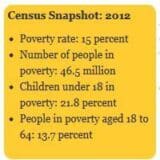
Recovery?
What recovery? The economic outlook may have picked up for some Americans, but not for those in the bottom income brackets –  and especially children — according to figures released by the U.S. Census Bureau on Tuesday.
and especially children — according to figures released by the U.S. Census Bureau on Tuesday.
In fact, there were nearly seven million more people living in poverty in 2012 than there were in 2008, the beginning of the Great Recession.
Overall, 46.5 million people were living at or below the poverty line last year, according to the agency’s major annual report on the issue, the Current Population Survey. And more than one-fifth of children, or 16 million youth, were living in poverty, the survey showed.
“They are still the age group suffering the most poverty,” Deborah Weinstein, executive director of the Coalition on Human Needs, said in a statement.
It was the 11th year in the last 12 that poverty “worsened or failed to improve,” according to the Center on Budget and Policy Priorities.


Two years ago the “Occupy” movement roared into view, summoning the energies and attention of large numbers of people who felt the economic system had got out of whack and were determined to do something about it.
Occupy put the issue of the nation’s savage inequality on the front pages, and focused America’s attention on what that inequality was doing to our democracy. To that extent, it was a stirring success.
But Occupy eschewed political organization, discipline, and strategy. It wanted to remain outside politics, and outside any hierarchical structure that might begin to replicate the hierarchies of American society it was opposing.
So when mayors, other public officials, and university administrators cleared the Occupy encampments by force — encampments that had become the symbol of the movement — nothing seemed to remain behind. Some Occupiers made plans for further actions, but a movement without structure, discipline, and strategy proved incapable of sustaining itself.
» Read more about: Occupy Wall Street’s Bittersweet Birthday »
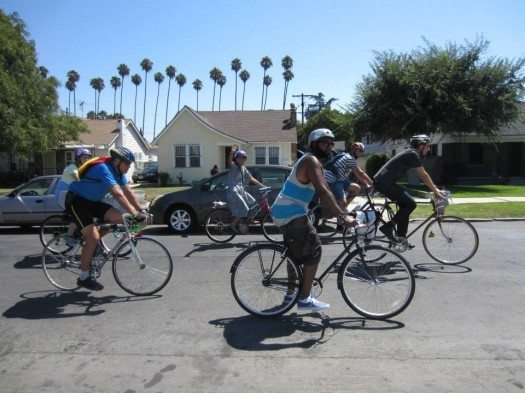

One in four adolescents in California—nearly one million—aren’t getting as much physical activity as they need to maintain a healthy weight. When a young Latino child living in a highly industrialized community gets out to play, how much good does that physical activity do her growing lungs if she’s inhaling a toxic soup of air pollution and greenhouse gases? What if she is more likely to get struck by a speeding car than she is to benefit from a lifetime of physical activity? For an African American child who has no nearby park, safe sidewalks or fresh air, there’s got to be a better answer.
A constellation of factors in the physical, social, economic and service environment are referred to as the social determinants of health because they have an overwhelming influence on health, quality of life and death rates, as compared to medical care — which is only responsible for 10-15 percent of what determines how healthy we are and how long we live.
» Read more about: How SB 1 Can Help Reduce Health Inequities »
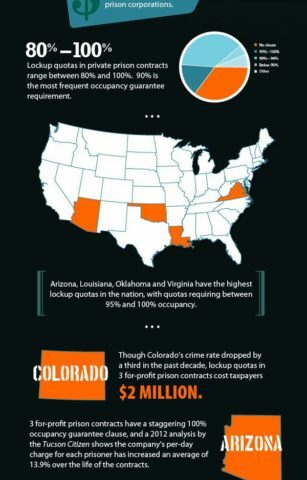
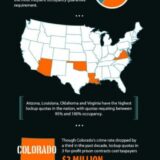
Today In the Public Interest released a report titled Criminal: How Lockup Quotas and “Low-Crime Taxes” Guarantee Profits for Private Prison Corporations.
The study documents the shocking prevalence of contract language between private prison companies and state and local governments that guarantee prison occupancy rates, which can accurately be described as “lockup quotas.”
If the quota is not met due to lower crime rates and a falling prison population, taxpayers are forced to pay for empty beds in what essentially amounts to a “low-crime tax” on communities.
Lockup quotas can have broad negative implications beyond obvious financial concerns and should be prohibited in any private prison contract. See report infographic below and the report here.
The more people are aware of lockup quotas the more we as a community are empowered to prevent this type of predatory language from existing in private prison contracts —
» Read more about: Stop Prison Inc. from Pushing Lockup Quotas »


Sunday’s Los Angeles Times carried one of those state-of-the-economy articles indicating that Americans are becoming more realistic in their estimates of their place on the country’s social ladder. Headlined, “Amid slow economic recovery, more Americans identify as ‘lower class,’” Emily Alpert’s feature focused on the latest General Social Survey, a 40-year research project conducted biannually by the National Opinion Research Center (NORC) at the University of Chicago.
The upshot is that fewer low-income people are clinging to the fantasy that they form part of the “middle class” – or even the “working class.” Instead, they are coming to realize that they help comprise the “lower class,” a destination once regarded as an economic leper colony but now accepted as just another fact of life.
As Alpert reports, the GSS revealed that “a record 8.4 percent of Americans put themselves in that category — more than at any other time in the four decades that the question has been asked on the General Social Survey.”
Since the start of the 2009 recession we’ve become acquainted with – almost inured by – metrics showing how high up on the economic pyramid people unreasonably see themselves.
» Read more about: A Touch of Class: Knowing Our Place on the Social Ladder »
Frying Pan News reviewer Vivian Rothstein called Go Public: A Day in the Life of an American School District “an antidote to the doom and gloom pronouncements of Waiting for Superman and other recent corporate-sponsored films.”
This documentary, created by Jim and Dawn O’Keeffe, memorably follows 50 individuals (students, faculty and others) during a single school day. Its filmmakers focus on Pasadena’s public school district as it struggles to head off catastrophic budget cuts to 28 schools. It’s a primer on the importance of public education and how successful it can be with the support of parents and administrators.
The film can be seen in three widely separate local venues this weekend. On Saturday it’s part of the Catalina Film Festival and screens 1-3 p.m. at the Lancer Auditorium in Avalon. Sunday, it shows at Pasadena’s Lake Avenue Church (1-3 p.m.) and at USC’s Ray Stark Family Theater (6-8 p.m.).
» Read more about: ‘Go Public’ School Documentary Screens This Weekend »
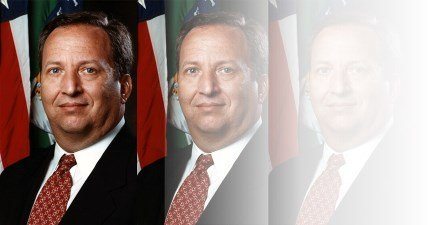

The Democratic Party’s romance with Wall Street may finally be breaking up. In the past 10 days, a diverse group of Democratic senators scuttled Larry Summers’s candidacy for Federal Reserve chair and New York Democrats voted for the mayoral candidate whose campaign was an attack on Michael Bloomberg’s care and feeding of the super-rich at the expense of the rest of the city. Former commerce secretary (and JP Morgan Chase executive) William Daley’s surprise withdrawal from the Illinois Democratic gubernatorial primary is one more indication of Wall Street’s diminished sway.
Democrats have reached a watershed. After two decades in which the party has moved leftward on social issues but has largely accepted the financial sector’s economic preferences — for smaller government; a greater role for markets; and reduced regulation, particularly of finance — the abject failures of the market economy are pushing the party leftward.
» Read more about: Summers of Our Discontent: Wall Street’s Luster Fades »


Here’s a surprisingly little secret: You know all those dates you see on food products—sell by, use by, best before? Those dates do not indicate the safety of your food, and generally speaking, they’re not regulated.
 If this is news for you, you’re not alone. In fact, according to one industry study, 90 percent of Americans at least occasionally throw food away prematurely because they mistakenly interpret the date label to mean their food is unsafe; 25 percent do so every time. In the U.K., they’ve estimated about 20 percent of food wasted in households is due to confusion over expiration dates. If this same estimate were true here, it would mean the average household of four could be spending $275-450 on discarding food that is perfectly fine, just because they misinterpret the label date.
If this is news for you, you’re not alone. In fact, according to one industry study, 90 percent of Americans at least occasionally throw food away prematurely because they mistakenly interpret the date label to mean their food is unsafe; 25 percent do so every time. In the U.K., they’ve estimated about 20 percent of food wasted in households is due to confusion over expiration dates. If this same estimate were true here, it would mean the average household of four could be spending $275-450 on discarding food that is perfectly fine, just because they misinterpret the label date.
Today, in partnership with the Harvard Food Law and Policy Clinic,
» Read more about: Misleading Food Sell-By Dates: Waste Not, Toss Not! »
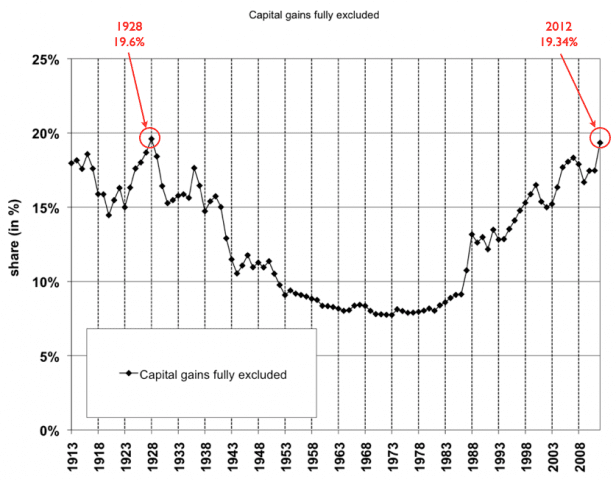
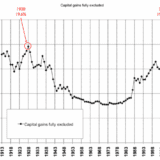
Are our rich content? It’s a question that bounces back and forth in the blogosphere. Are elites, economic and otherwise, happy with the pace of the weak recovery? Are they indifferent? Or are they actively worse off than they would be if unemployment were lower?
This question comes up when Emmanuel Saez updates his data on the incomes of the top one percent. Most of the coverage has focused on the rate of change for incomes of the top one percent, particularly the fact that the top one percent have enjoyed 95 percent of all income growth from 2009 to 2012. But I want to focus on levels. I’m going to modify one of Saez’s charts to show something I don’t think has been pointed out:
This is the percentage of all income, excluding capital gains, that goes to the top one percent.
» Read more about: Why 2012 Was the One Percent’s Favorite Year Since 1928 »